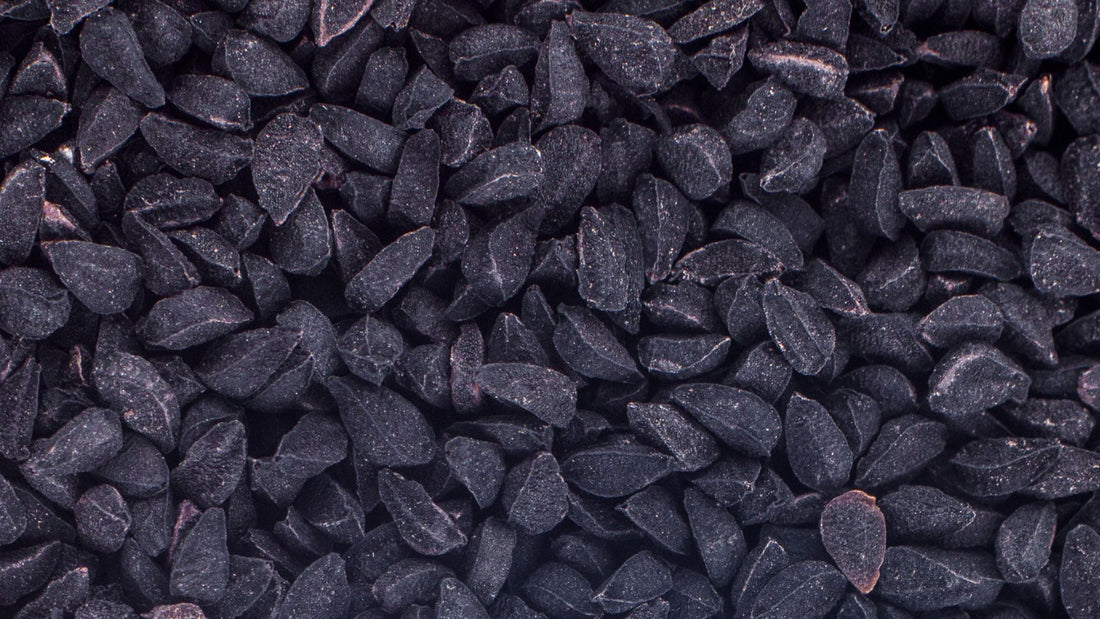One of the main reasons we love natural ingredients at The Soapery is the numerous uses and benefits of just one product. That said, it’s easy to be carried away by claims, and to expect almost-impossible results from a tiny little bottle.
To help you make confident and conscious purchases, we’re here to investigate what the studies really show. In our last post, we questioned the haircare claims for rosemary oil, and now it’s time for black seed oil and hair growth to step onto the podium.
Contents
- What is black seed oil?
- Nigella Sativa plant and coconut oil study
- Black seed oil hair loss study
- Black cumin seed essential oil study
- Conclusion
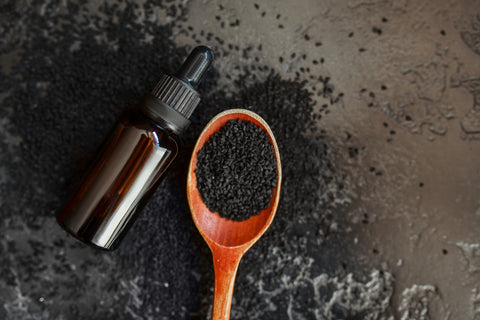
What is black seed oil?
Black cumin seed oil (also known as nigella sativa oil) is the oil extracted from the seeds of the Nigella Sativa plant, which are commonly called ‘nigella seeds’ in cooking.
Black seed oil isn’t the same as black seed essential oil. The two terms shouldn’t be confused, as the first is a carrier oil, whereas the latter is an essential oil
The difference is important because a carrier oil are natural oils that are skin safe, and an essential oil is a concentrated plant extract that usually isn't skin safe.
Keep this distinction in mind for when we get to the studies!
Our Black Cumin Seed Oil is extracted by cold pressing Nigella Sativa seeds below 35C to preserve its natural qualities. It’s 100% pure and certified Organic by the Soil Association.
Black seed oil has long been used in traditional medicine. Found in Tutankhamun’s tomb back in 3300BC, the oil is popularly referred to as the ‘Gold of the Pharaohs’. In Islam, it’s believed that an apostle of Allah proclaimed ‘‘there is healing in black cumin for all diseases but death’’.
Surely, with thousands of years of raving reviews, it must be doing something?
Black seed oil for hair growth

Nigella Sativa plant and coconut oil study
Let’s start with this 2014 study on coconut oil and herbs for hair growth.
Four different solutions were made: pure coconut oil, coconut oil mixed with Nigella Sativa (the one we’re interested in!), coconut oil mixed with Aleurites moluccanus (or candlenut), and coconut oil mixed with both herbs.
The four solutions were applied to shaven sections of the participants’ hair and after about four weeks the Nigella Sativa solution was found to be the most effective.
It’s not such a clear win for black seed oil, though.
Firstly, the study had only 3 participants (yes, just 3!). Secondly, they used the herb, not the oil at all. And, finally, it was diluted in coconut oil. The findings don’t count for much when we’re looking at black seed oil and hair growth.
There’s also no recipe or dilution given, it doesn’t say how much oil was applied to the scalp, for how long, or how many times. That’s some hefty hurdles to jump over if you’re wanting to replicate the study at home.
KEY TAKEAWAY: this study tells us nothing about whether black seed oil can promote hair growth. It's evidence should be ignored.
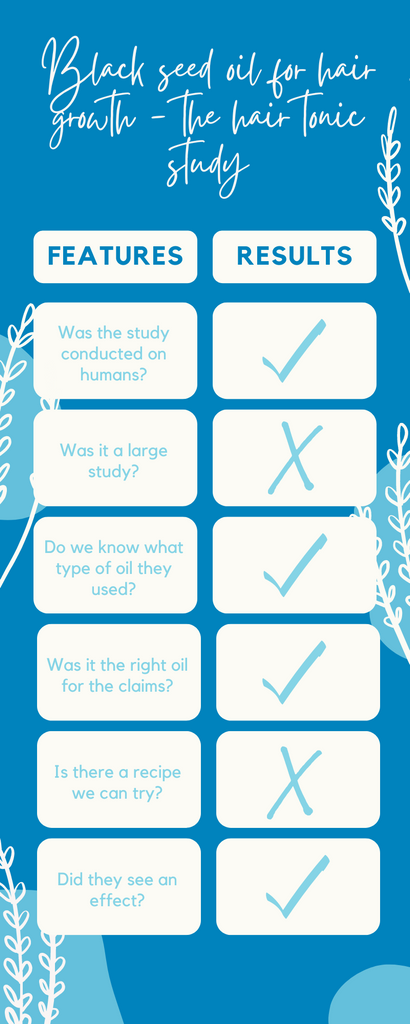
Black seed oil hair loss study
A 2013 study in Bangladesh also looked at Nigella Sativa in a blend with coconut oil, this time with a lengthier shopping list. Researchers created a ‘hair tonic oil’, containing coconut oil, black seed oil, henna leaf, amla fruit, Bermuda grass, and fenugreek seeds.
After using the solution, the participants all experienced a significant reduction in hair fallout during combing.
That said, the ingredients aren’t exactly household items. Where are you going to find amla fruit and Bermuda grass in the UK? And the results of this study could easily be due to anything on the list, and not the black seed oil itself.
The method is lengthy too. They dried the herbs, ground them into a powder, and soaked them in 3 litres of water for 10 hours. Then they boiled and filtered the mixture, repeated it 3 times, reduced the total volume to 5 litres, and mixed it with the coconut oil.
Phew! And it doesn’t stop there.
They heated it to the hellish temperature of 1000C, boiled it until all the water evaporated, and added a preservative. We don’t know about you, but we won’t be certainly won’t be putting that much time and effort (and heat!) into promoting hair growth.
KEY TAKEAWAY: This study is impossible to replicate at home, so you’re unlikely to experience the same results. This evidence should be ignored.
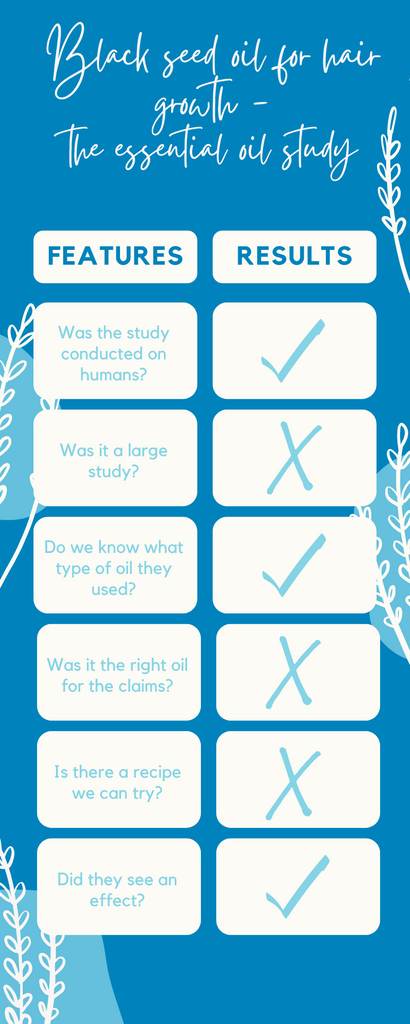
Black cumin seed essential oil study
Black cumin seed essential oil was used in a study that investigated its effect on patients with telogen effluvium, a common and usually temporary type of hair loss due to a disturbance of the normal hair cycle.
Ten patients were treated with a scalp lotion containing 0.5% black seed essential oil, and ten patients were treated with a placebo, for three months. The results showed a significant improvement in the hair density and thickness of 70% of the patients treated with black seed essential oil.
Sounds too good to be true, right? That’s why we took it into our own hands.
Thymoquinone makes up 30-48% of black seed essential oil in this study, whereas our black seed oil has a Thymoquinone content of between 1% and 3% (varying batch to batch). Looking at the recipe stated in the study, you need to use at least 7.5ml of our black seed oil to achieve the levels of Thymoquinone in this treatment.
So, we made the recipe doing just that.
We found that these measurements meant the mixture started to separate. It also doesn’t say which type of alcohol they used (it could be their leftover wine for all we know!).
This study does not show that black seed oil can promote hair regrowth
KEY TAKEAWAY: These results show that black seed essential oil could help hair loss but if you try to use black seed oil, it won't work.
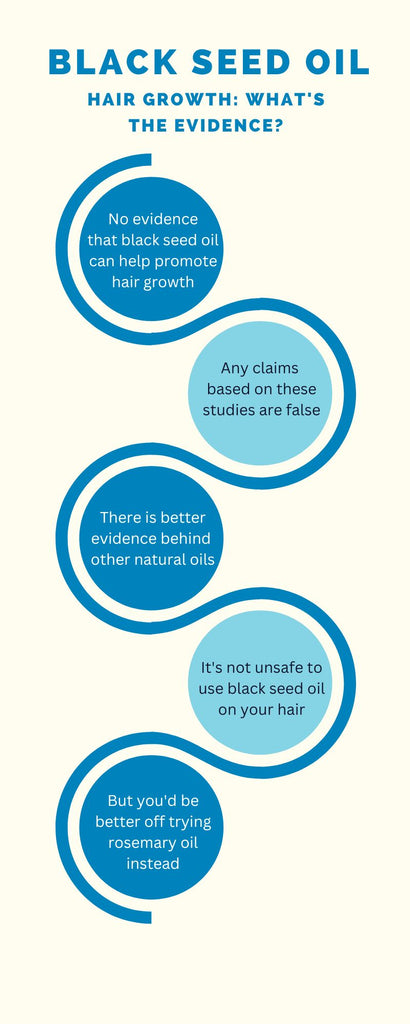
Conclusion: does black seed oil promote hair growth?
There's no evidence that black seed oil can help promote healthy hair growth. You're better off trying something else like rosemary oil instead.
However if you do decide to try our black cumin seed oil for your hair issues, let us know in the comments if it worked for you!
